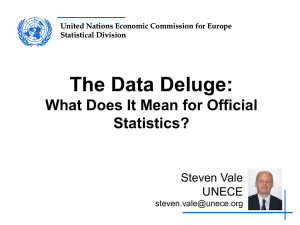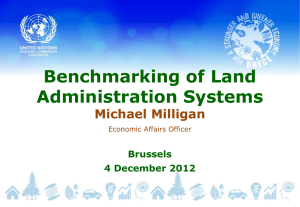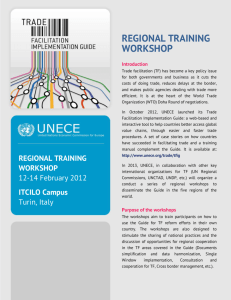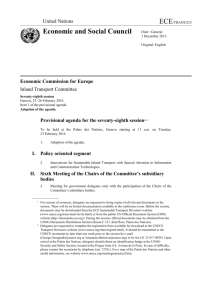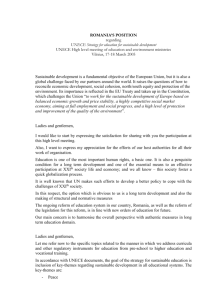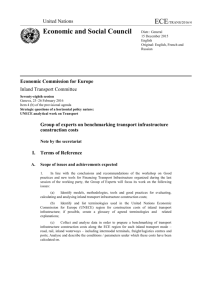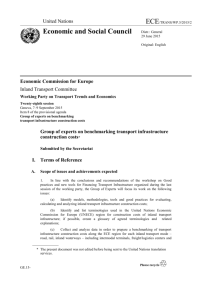UNECE Weekly - United Nations Economic Commission for Europe
advertisement
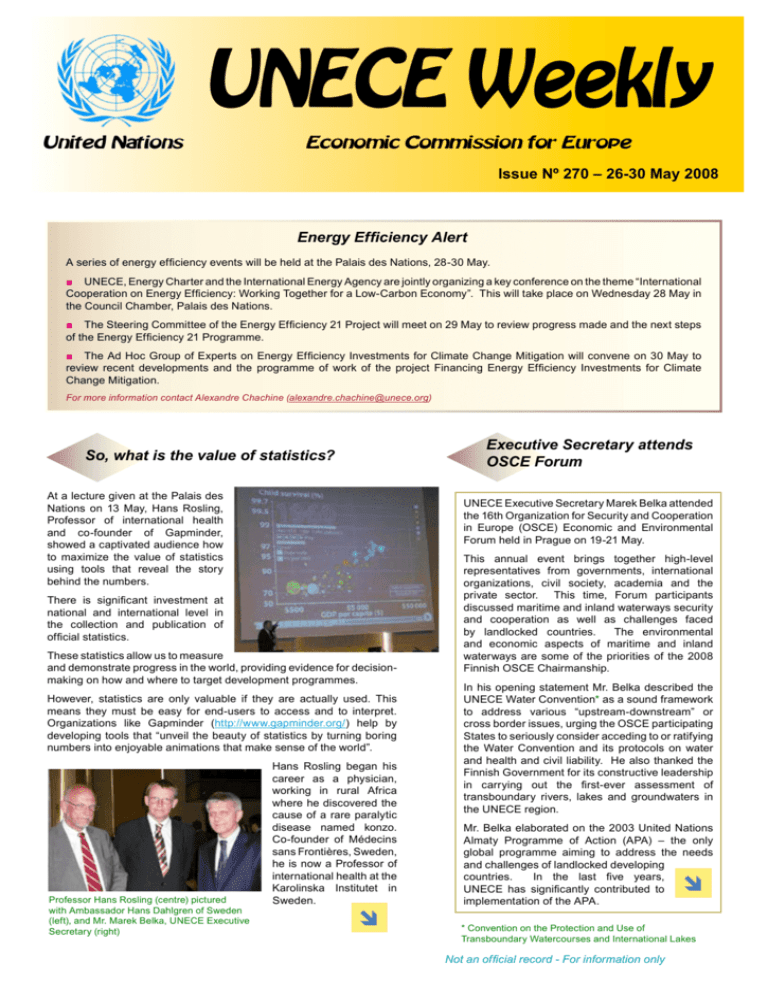
UNECE Weekly United Nations Economic Commission for Europe Issue Nº 270 – 26-30 May 2008 Energy Efficiency Alert A series of energy efficiency events will be held at the Palais des Nations, 28-30 May. ■ UNECE, Energy Charter and the International Energy Agency are jointly organizing a key conference on the theme “International Cooperation on Energy Efficiency: Working Together for a Low-Carbon Economy”. This will take place on Wednesday 28 May in the Council Chamber, Palais des Nations. ■ The Steering Committee of the Energy Efficiency 21 Project will meet on 29 May to review progress made and the next steps of the Energy Efficiency 21 Programme. ■ The Ad Hoc Group of Experts on Energy Efficiency Investments for Climate Change Mitigation will convene on 30 May to review recent developments and the programme of work of the project Financing Energy Efficiency Investments for Climate Change Mitigation. For more information contact Alexandre Chachine (alexandre.chachine@unece.org) Executive Secretary attends OSCE Forum So, what is the value of statistics? At a lecture given at the Palais des Nations on 13 May, Hans Rosling, Professor of international health and co-founder of Gapminder, showed a captivated audience how to maximize the value of statistics using tools that reveal the story behind the numbers. UNECE Executive Secretary Marek Belka attended the 16th Organization for Security and Cooperation in Europe (OSCE) Economic and Environmental Forum held in Prague on 19-21 May. There is significant investment at national and international level in the collection and publication of official statistics. These statistics allow us to measure and demonstrate progress in the world, providing evidence for decisionmaking on how and where to target development programmes. However, statistics are only valuable if they are actually used. This means they must be easy for end-users to access and to interpret. Organizations like Gapminder (http://www.gapminder.org/) help by developing tools that “unveil the beauty of statistics by turning boring numbers into enjoyable animations that make sense of the world”. Professor Hans Rosling (centre) pictured with Ambassador Hans Dahlgren of Sweden (left), and Mr. Marek Belka, UNECE Executive Secretary (right) Hans Rosling began his career as a physician, working in rural Africa where he discovered the cause of a rare paralytic disease named konzo. Co-founder of Médecins sans Frontières, Sweden, he is now a Professor of international health at the Karolinska Institutet in Sweden. This annual event brings together high-level representatives from governments, international organizations, civil society, academia and the private sector. This time, Forum participants discussed maritime and inland waterways security and cooperation as well as challenges faced by landlocked countries. The environmental and economic aspects of maritime and inland waterways are some of the priorities of the 2008 Finnish OSCE Chairmanship. In his opening statement Mr. Belka described the UNECE Water Convention* as a sound framework to address various “upstream-downstream” or cross border issues, urging the OSCE participating States to seriously consider acceding to or ratifying the Water Convention and its protocols on water and health and civil liability. He also thanked the Finnish Government for its constructive leadership in carrying out the first-ever assessment of transboundary rivers, lakes and groundwaters in the UNECE region. Mr. Belka elaborated on the 2003 United Nations Almaty Programme of Action (APA) – the only global programme aiming to address the needs and challenges of landlocked developing countries. In the last five years, UNECE has significantly contributed to implementation of the APA. * Convention on the Protection and Use of Transboundary Watercourses and International Lakes Not an official record - For information only continued Much of his work relies on analysis of data and he is passionate about communicating the valuable knowledge that can be drawn from statistics. If you missed the lecture last week, you may enjoy watching one of his videos at http://www.gapminder.org/ video/talks/. continued UNECE has supported the development of transport infrastructure at the regional, pan-European level in the context of the Trans-European Motorway (TEM) and Trans-European Railway (TER) projects. Jointly with UNESCAP, it has promoted the transcontinental harmonization of transport investments in the context of the Euro-Asian Transport Linkages project including hosting the Ministerial Meeting in Geneva in February 2008. A joint UNECE/UNESCAP regional expert review of the APA was organized in Bangkok on 22-23 April. UNECE will actively participate in the United Nations General Assembly’s Midterm Review of the APA in New York in October. As many as nine UNECE border crossing facilitation conventions will be highlighted and promoted at the UN Treaty Event accompanying this special General Assembly session. UNECE would like to thank the Permanent Mission of Sweden for co-hosting this event and Professor Rosling for taking the time to provide this fascinating lecture. For more information contact Jessica Gardner (support.stat@unece.org). Ratifications ... Accessions ... (UNECE Multilateral Treaties deposited with the Secretary General) European Agreement on Important International Combined Transport Lines and Related Installations (AGTC) of 1 February 1991 Accession: Albania (21 May 2008) Facts and Figures At the Forum, Mr. Belka met Mr. Marc Perrin de Brichambaut, OSCE Secretary General, to discuss the ongoing and future cooperative initiatives between the two organizations. He also discussed the preparations for the forthcoming review of the APA with Mr. Cheick Sidi Diarra, UN Under-Secretary General and High Representative for the Least Developed Countries, Landlocked Developing Countries and Small Island Developing States (see photo). For more information contact: Robert Nowak robert.nowak@unece.org or visit http://www. unece.org/trans/ead_sec.htm. Female share of graduates from advanced research programmes, 1995 and 2006 (per cent) The share of women graduating from advanced research programmes is rising Over the last decade, education has remained a domain where the gender balance seems attainable across the UNECE region. This is reflected not only in a growing proportion of girls that complete their secondary education, but also in an important rise in the share of adult women with completed tertiary education. In 1995-2006, the gender gap narrowed noticeably also among the graduates from advanced research programmes, and in several UNECE countries even turned to the advantage of women. Yet, in the majority of countries in the chart male graduates still outnumber females. In the Russian Federation the share of women has recently declined; and the gap between males and females remains very wide in Azerbaijan and Georgia. The Czech Republic and Switzerland, where women graduates from advanced research programmes accounted for less than 40% in 2006, still lag behind relative to other countries with similar income levels. Note: Advanced research programmes refer to the second stage of tertiary education which leads to the award of an advanced research qualification. *Or the latest available. Source: UNECE Gender Database (http://www.unece.org/stats/data). Information Service UN Economic Commission for Europe (UNECE) CH - 1211 Geneva 10, Switzerland Tel: +41(0)22 917 44 44 Fax: +41(0)22 917 05 05 E-mail: info.ece@unece.org Website: http://www.unece.org Not an official record - For information only
